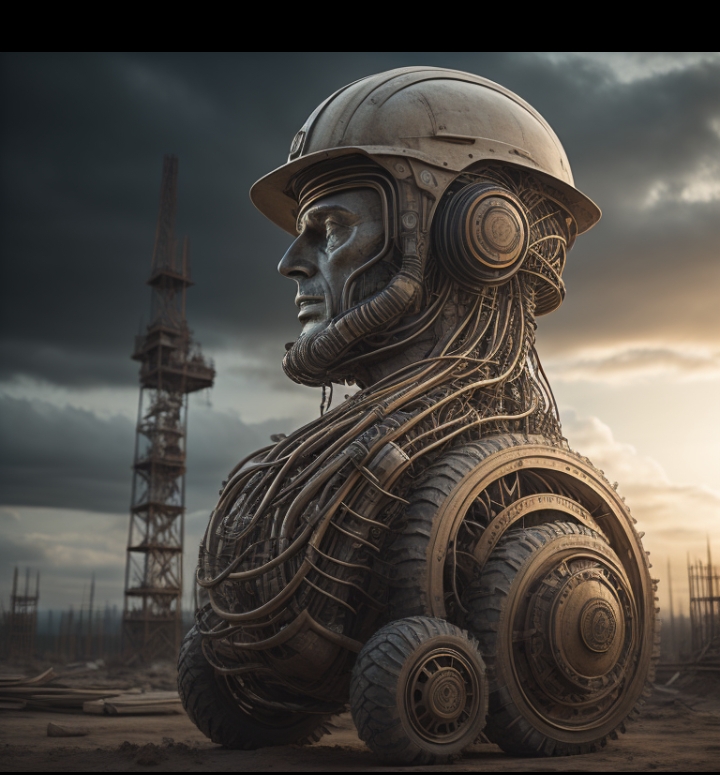AI to Help Construction Industry
- AI is revolutionizing the construction industry by addressing several of its longstanding challenges. From improved project management to enhanced safety measures, here are some examples of how AI is making a significant impact on the construction sector.
1. **Project Scheduling and Management**:
- AI-driven tools can analyze historical project data, weather conditions, and other factors to create more accurate project schedules. For instance, Procore’s Construction Intelligence solution uses AI to predict potential delays and bottlenecks, allowing project managers to proactively address issues and optimize schedules.
2. **Cost Estimation**:
AI algorithms can analyze project specifications( Construction Industry) and historical cost data to provide more accurate and timely cost estimates. This can help contractors submit more competitive bids and reduce the risk of cost overruns. Companies like BuildSim are using AI to improve cost estimation accuracy.
3. **Safety Monitoring**:
- AI-powered cameras and sensors can continuously monitor construction sites for safety compliance. For example, Smartvid.io uses computer vision to identify safety hazards in images and videos, helping companies identify and prevent potential accidents.
4. **Quality Control**:
AI can be employed to inspect construction materials and workmanship, ensuring that the project meets quality standards. Drones equipped with AI algorithms are used for aerial inspections, while software like Briq’s Quality AI analyzes data to identify and prevent quality issues.
5. **Risk Management**:
AI can assess various project risks, including financial, operational, and environmental factors. Risk analysis tools like RiskWatch use AI to provide real-time risk assessment, helping construction companies mitigate potential threats.
6. **Design Optimization**:
Generative design algorithms can suggest more efficient and cost-effective designs. For instance, Autodesk’s generative design tool helps architects and engineers explore numerous design options, optimizing the use of materials and resources.
7. **Supply Chain Management**:
AI can help optimize the supply chain by predicting material shortages, suggesting alternative suppliers, and monitoring inventory levels. Katerra, a construction technology company, uses AI to streamline the supply chain and reduce costs.
8. **Construction Equipment Maintenance**:
- Predictive maintenance powered by AI can extend the lifespan of construction equipment by detecting issues before they cause a breakdown. This reduces downtime and maintenance costs. Companies like Uptake offer such solutions for equipment monitoring.
9. **Energy Efficiency**:
AI-driven building management systems can optimize energy consumption in completed construction projects. These systems adapt to user behavior and external factors to reduce energy waste. Honeywell’s Forge Energy Optimization uses AI to achieve energy efficiency in commercial buildings.
10. **Labor Productivity**:
AI-powered wearables and tools can help construction workers perform tasks more efficiently and safely. For example, the Exoskeleton by Ekso Bionics can reduce fatigue and the risk of injuries, ultimately enhancing productivity.
11. **Predictive Analytics**:
AI can analyze large datasets to predict potential issues, such as equipment failures or construction delays. This allows for proactive decision-making. Bentley Systems offers predictive analytics solutions for construction projects.
12. **Regulatory Compliance**:
AI can help construction companies stay compliant with ever-evolving regulations by analyzing and monitoring changes in relevant laws and standards. Tools like LegiNation can provide real-time updates and compliance information.
13. **BIM (Building Information Modeling)**:
BIM software, enhanced by AI, enables the creation of detailed 3D models of construction projects. These models facilitate better project visualization and coordination among stakeholders, reducing errors and rework.
14. **Site Monitoring and Surveillance**:
AI-powered cameras and drones can monitor construction sites 24/7, providing real-time security and surveillance. These systems can alert site managers to unauthorized access and potential security breaches.
15. **Remote Collaboration**:
AI-enhanced communication tools facilitate remote collaboration among team members and stakeholders. These tools, such as PlanGrid, allow for real-time updates and information sharing, reducing the need for physical presence on-site.
In conclusion, AI is transforming the construction industry by addressing various challenges, including project management, cost estimation, safety monitoring, quality control, and risk management. These AI-driven solutions improve efficiency, reduce costs, and enhance safety on construction sites. As technology continues to advance, the construction industry will benefit from even more innovative AI applications, ultimately improving project outcomes and the overall construction process.
For more information visit at https://happenrecently.com/zepto/?amp=1







